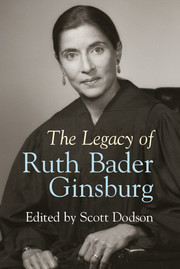Book contents
- Frontmatter
- Contents
- Contributors
- Preface
- Acknowledgments
- Part I Shaping a Legacy
- Part II Rights and Remedies
- Part III Structuralism
- Part IV The Jurist
- 13 Reflections on the Confirmation Journey of Ruth Bader Ginsburg, Summer 1993
- 14 Justice Ginsburg
- 15 Oral Argument as a Bridge between the Briefs and the Court’s Opinion
- 16 Fire and Ice
- Coda
- Notes
- Index
14 - Justice Ginsburg
Demosprudence through Dissent
Published online by Cambridge University Press: 05 February 2015
- Frontmatter
- Contents
- Contributors
- Preface
- Acknowledgments
- Part I Shaping a Legacy
- Part II Rights and Remedies
- Part III Structuralism
- Part IV The Jurist
- 13 Reflections on the Confirmation Journey of Ruth Bader Ginsburg, Summer 1993
- 14 Justice Ginsburg
- 15 Oral Argument as a Bridge between the Briefs and the Court’s Opinion
- 16 Fire and Ice
- Coda
- Notes
- Index
Summary
October Term 2006 was an unusual one for the Supreme Court. On seven occasions, more than any other term on record, a justice issued an oral dissent from the bench. New York Times reporter Linda Greenhouse proclaimed that the term would also “be remembered as the time when Justice Ruth Bader Ginsburg found her voice, and used it.” The events of that year would indeed foreshadow Justice Ginsburg’s emerging role as a forceful and passionate dissenter, an objecting voice within a Court that has been increasingly viewed as activist and divided. As the legal community and media noted her two oral dissents that term, she affirmed her position going forward: “I will continue to dissent if, in my judgment, the court veers in the wrong direction when important issues are at stake.”
I have written previously about how a dissent, at its best, represents an act of demosprudence. Demosprudence is a term Professor Gerald Torres and I coined to describe the process of making and interpreting law from an external – not just internal – “people-driven” perspective. That perspective emphasizes the role of informal democratic mobilizations and wide-ranging social movements that serve to make formal institutions, including those that regulate legal culture, more democratic. Demosprudence focuses on the ways that the demos (especially through social movements) can contribute to the meaning of law. The foundational hypothesis of demosprudence is that the wisdom of the people should help inform the lawmaking enterprise in a democracy. From this view, the Court gains a new source of democratic authority when its members engage ordinary people and other legislative authorities, such as Congress, in a productive dialogue about the potential role of “We the People” in lawmaking. I highlight two instances in which reading her dissent from the bench reveals Justice Ginsburg’s demosprudential orientation to the law.
- Type
- Chapter
- Information
- The Legacy of Ruth Bader Ginsburg , pp. 206 - 216Publisher: Cambridge University PressPrint publication year: 2015
- 1
- Cited by



